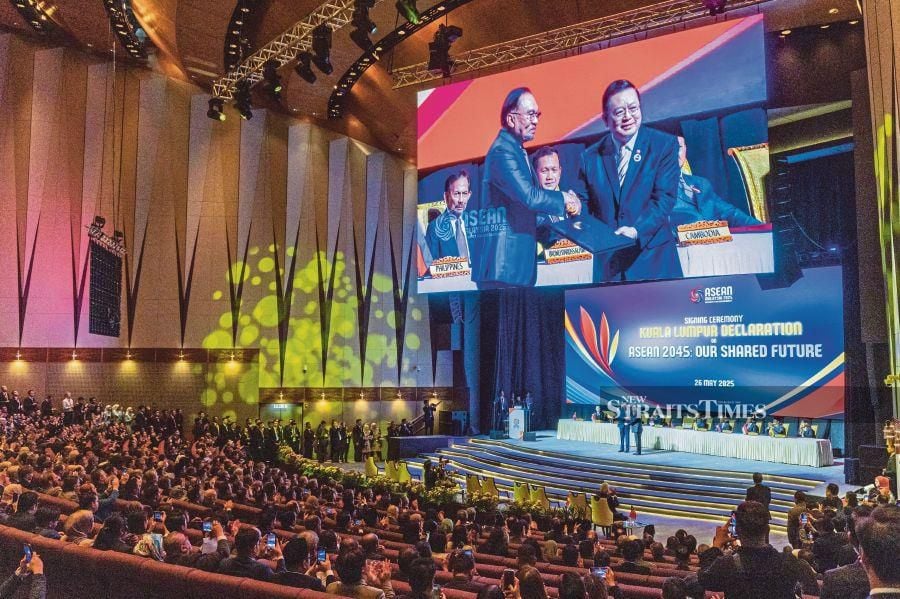
The 46th Asean Summit, under Malaysia's chairmanship, has reaffirmed the bloc's commitment to navigating an increasingly complex global landscape, championing unity, economic resilience and principled diplomacy.
As the curtains closed on the summit, Prime Minister Datuk Seri Anwar Ibrahim underscored the leaders' resolve to confront mounting geopolitical and economic pressures from the humanitarian crisis in Gaza to the intensifying strategic competition between global powers.
Anwar emphasised that Asean must act with a collective voice, grounded in multilateralism and inclusive decision-making.
Under Malaysia's chairmanship, one of the most notable institutional developments was the reaffirmation that Timor-Leste's accession to Asean is firmly on track, with full membership expected by October.
In his closing press conference, Anwar reiterated Malaysia's strong support for Timor-Leste's integration, pledging that the bloc would do "whatever necessary" to facilitate the process under the Asean Foreign Ministers' framework.
The summit also addressed the prolonged Myanmar crisis, with Asean leaders agreeing to push for an expanded nationwide ceasefire as a necessary precursor to inclusive political dialogue.
Anwar, who recently engaged both Myanmar's junta chief Min Aung Hlaing and the opposition National Unity Government, said Asean remained a neutral platform for trust-building and eventual reconciliation.
One of the summit highlights was the adoption of the Kuala Lumpur Declaration on Asean 2025 and Beyond, a long-term strategic framework aimed at reinforcing Asean centrality and enhancing the bloc's role on the global stage.
The declaration envisions a more assertive and responsive Asean in addressing regional concerns like the South China Sea and the Myanmar conflict.
Nusantara Academy for Strategic Research senior fellow Dr Azmi Hassan described the declaration as Malaysia's signal that Asean must evolve to stay relevant.
"The two main strategies are to increase Asean's involvement globally and reinforce the centrality concept.
"This includes staying neutral, especially in great power rivalries and trade conflicts, and being more proactive in shaping the global discourse," he said.
While the KL Declaration outlines a 20-year vision, Azmi believes its key goals are achievable within the next three to four years, depending on the direction set by future Asean chairs.
"Even as the Philippines takes over the chairmanship next year, Malaysia wants to remain in the pilot seat," he added.
On the economic front, the summit produced a strong regional response to the United States' retaliatory tariffs, which target Asean exports with duties ranging from 10 to 49 per cent.
Anwar made it clear that unilateral trade actions threatened global economic stability and undermined Asean's commitment to fair and open trade.
He confirmed that the bloc would pursue engagement with Washington through diplomatic channels, favouring cooperation over confrontation.
As such, any decisions made in regards to the tariffs should not be made to the detriment of other member countries.
In a major diplomatic breakthrough, the summit also hosted the inaugural trilateral meeting between Asean, China and the Gulf Cooperation Council (GCC).
This, in itself, was a coup of sorts, as Anwar described the gathering attended by Chinese Premier Li Qiang as a strategic milestone and a testament to Asean's growing convening power.
This summit was apart from the Asean-GCC Summit, held for only the second time.
Anwar said the spirit of Asean centrality remains critical to regional cooperation.
The Asean-GCC-China Summit also saw a united call by Asean, China and the GCC for an immediate and lasting ceasefire in Gaza.
It condemned attacks on civilians and demanded full humanitarian access, including the restoration of essential services such as water, electricity, food, fuel and medicine.
In his closing press conference, Anwar said the summit represented one of the most substantive milestones in Asean's history.
He added that the summit had successfully achieved its objectives, attributing the outcome to the strong support and unity among Asean leaders, as well as the bloc's first meaningful simultaneous engagement with the GCC and China.
He also said Malaysia's chairmanship would continue to focus on building a more inclusive, sustainable, and resilient Asean, in line with the bloc's long-term vision.
Source: New Straits Times
Share: